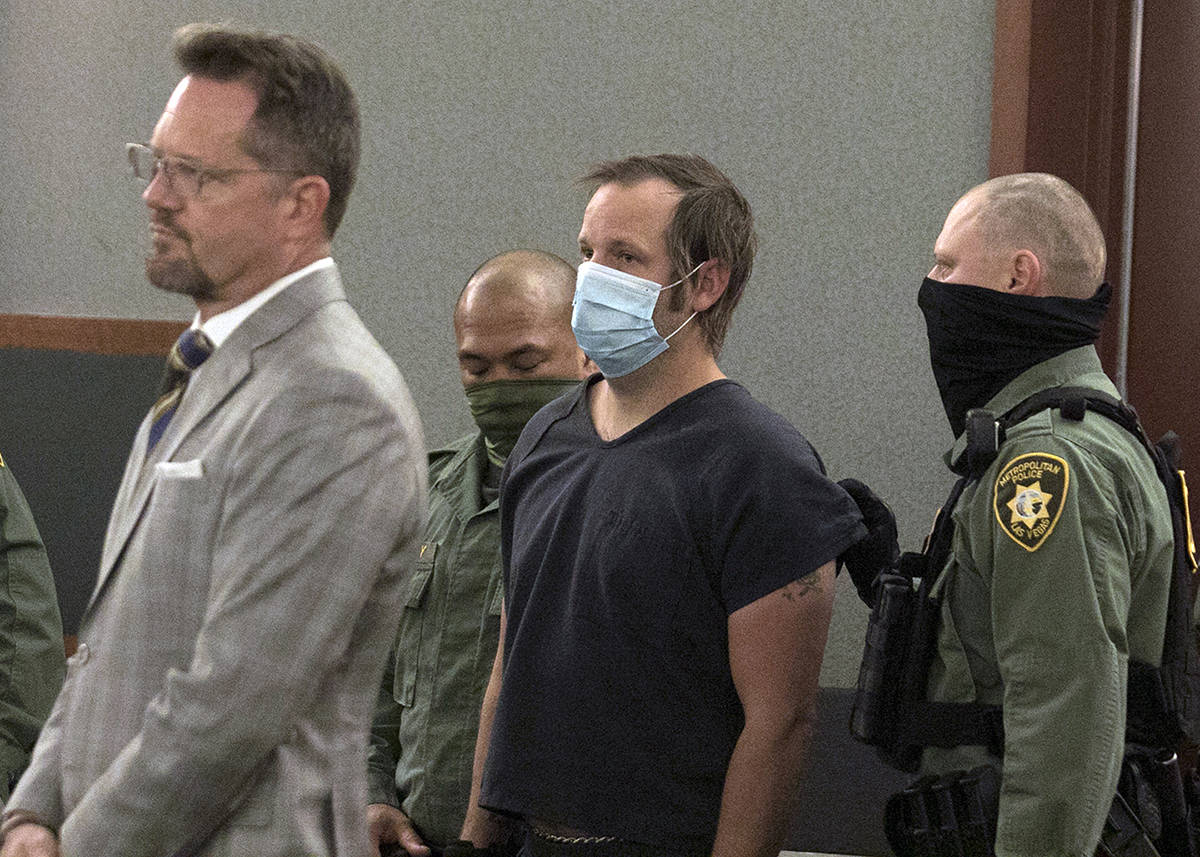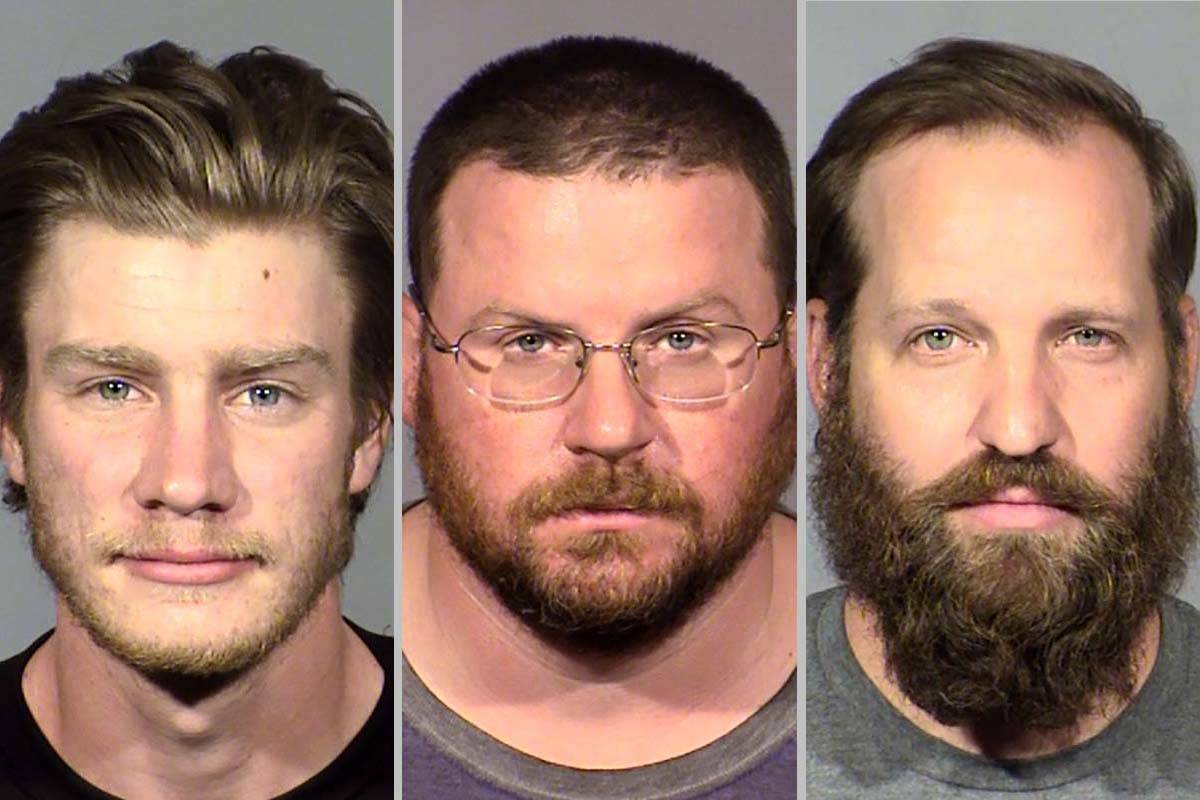Boogaloo informant reveals how he helped FBI infiltrate Las Vegas group
An FBI informant told a county grand jury that he secretly wore a body camera and a microphone to record meetings with suspected members of the boogaloo movement as they plotted firebombings and scouted potential targets, transcripts obtained by the Review-Journal show.
The informant, identified by the pseudonym “John Smith,” spent two hours on the witness stand June 16 detailing his undercover encounters with the right-wing extremist group as the alleged terror conspiracy unfolded.
It took the Clark County grand jury just three minutes later that day to deliberate and approve an indictment against Andrew Lynam, 23; Stephen Parshall, 36; and William Loomis, 40.
All three suspected boogaloo members were indicted on terrorism and explosives charges in an alleged scheme to cause violence at Black Lives Matter protests and firebomb a power substation and a U.S. ranger station near Lake Mead. A federal grand jury indicted the trio on related charges the same day.
The grand jury transcripts revealed a discussion among boogaloo members to throw Molotov cocktails at another target: police cars at a Las Vegas police substation in the northwest part of the valley. The plan was abandoned because the group concluded that it was too risky because of cameras surrounding the building.
The confidential FBI source testified that, in all, he was paid $1,000 plus expenses in the month he helped the bureau infiltrate the local boogaloo group. He also had introduced an undercover FBI agent to the group.
The informant said he met the defendants through the group’s Facebook page, Battle Born Igloo, which has since been removed. At the time, there could have been as many as 40 members in the group, which was beginning to recruit members at Nevada ReOpen rallies, the source testified.
He said he had been part of the moderate end of the boogaloo community that believed in the right to carry guns but did not advocate violence. He went to the FBI after he became concerned about the local group’s anarchist leanings during discussions with Lynam and Parshall at an April 18 ReOpen protest outside the Grant Sawyer State Office Building, he explained.
Undercover work described
The transcripts described how the informant went on hikes with boogaloo members to get acquainted, discussed the firebombings, scouted the targeted sites, carried weapons to Nevada ReOpen rallies and participated in Black Lives Matter protests. All the while, the group used code words and took military-style measures to evade any law enforcement surveillance.
“This isn’t a group for screwing around,” the informant quoted Lynam, the alleged leader, as saying. “It’s a group dedicated to overthrowing the United States federal government.”
During one discussion, Parshall, a Navy veteran, indicated that he had bought a life insurance policy to take care of his family in case he ended up getting killed, the informant testified.
Only one other witness, the lead FBI agent in the case, testified before the grand jury. Agent Blake Vogt supported the informant’s account and said both Lynam and Loomis admitted roles in the conspiracy after the three defendants were arrested May 30. Parshall refused to be questioned without a lawyer present.
FBI agents had moved in after they learned that the men were prepared to toss Molotov cocktails at police during a downtown Black Lives Matter protest that night.
Under questioning from Deputy District Attorney Michael Dickerson, the informant told the grand jury that he had to follow several rules while working with the FBI.
“The key takeaways were essentially that I couldn’t participate in any acts of violence, so I couldn’t shoot at police officers or blow up any buildings, things like that,” he testified. “In addition, I couldn’t participate in any sort of entrapment activities, so I couldn’t suggest any plans.”
He said he also had to report any illegal activity to the FBI.
“OK. Did you abide by that? Dickerson asked.
“Yes, I did,” the informant responded.
But Parshall’s lawyer Robert Draskovich on Monday questioned the informant’s credibility.
“I’m gravely concerned that we have an informant whose identity is not known to us giving a narrative of what he claims occurred between my client and other co-defendants,” Draskovich said. “We’re to believe that he reached out to the FBI and became an informant out of the goodness of his heart? I find those circumstances suspect.”
Defense lawyer Richard Wright, who represents Loomis, and Lynam’s attorney Ryan Helmick declined to comment.
The high-profile case has attracted unprecedented cooperation between federal and local authorities amid the Black Lives Matter protests in Las Vegas and across the nation over the May 25 death of George Floyd in Minneapolis.
Martyrdom sought
Lynam, an Army reservist and medic, told the government informant that he was prepared to be a “martyr” for the boogaloo cause, which believes in an impending civil war and ultimate societal collapse, the transcripts show.
At the FBI’s request in May, the informant suggested to Lynam that he abandon plans to recruit more members and keep the group small, the transcripts show.
“By that point, the FBI agents I was working with had advised that they didn’t want the group to grow because it could precipitate more violence … that it would get out of control,” the informant testified. “So I indicated to (Lynam) that it would probably be smart to keep the group small, as it would be more secure that way.”
The plan to firebomb the power substation at Bonanza Road and Eastern Avenue took shape as protests were taking place in Las Vegas, transcripts show.
Parshall and Loomis, an Air Force veteran, believed that the area was heavily populated by minorities and that a power outage created by the bombing would incite more civil unrest, the informant testified.
“Now, just to be clear for the record, this was not a racist attack?” Dickerson asked.
“No, it wasn’t directly to harm African-Americans for the benefit of harming them,” the informant responded. “It was, in an odd way, to galvanize them to our cause.”
But Parshall called off the firebombing at the last minute on May 28 shortly before it was to take place.
He sent a message to the group late in the afternoon that he had driven by the power substation and saw “a bunch” of Metro Police officers there, the informant told the grand jury. Parshall also indicated that he thought police were watching his house.
The next evening, the group members went to a Black Lives Matter rally on the Strip but did not try to disrupt it.
They were arrested the following night.
Contact Jeff German at jgerman@reviewjournal.com or 702-380-4564. Follow @JGermanRJ on Twitter. German is a member of the Review-Journal’s investigative team, focusing on reporting that holds leaders and agencies accountable and exposes wrongdoing. Support our journalism.
























